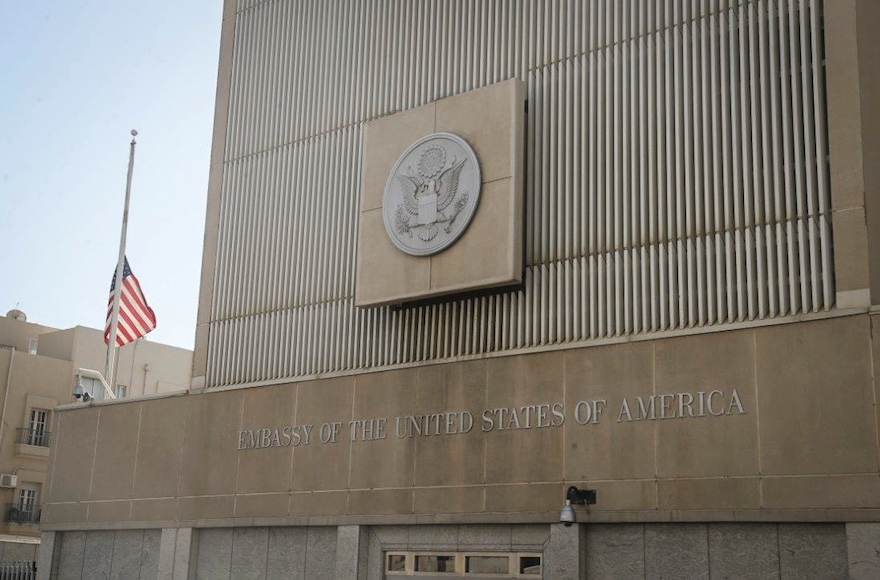JERUSALEM (JTA) — The transition team for President-elect Donald Trump is already checking possible locations in Jerusalem for the U.S. Embassy, according to an Israeli news channel.
Channel 2 reported Monday night that officials from Israel’s Foreign Ministry had begun looking into possible sites on behalf of the Trump team. The news came hours after Kellyanne Conway, a top Trump adviser, told conservative talk radio host Hugh Hewitt during his show that moving the embassy was a “big priority” for Trump.
“It is something that our friend in Israel, a great friend in the Middle East, would appreciate and something that a lot of Jewish Americans have expressed their preference for,” Conway said. “It is a great move. It is an easy move to do based on how much he talked about that in the debates and in the sound bites.”
Foreign Ministry officials last week reportedly met with officials from the Immigrant Absorption Ministry to discuss the availability of the Diplomat Hotel in the Talpiot neighborhood, a privately owned building that is home to 500 elderly immigrants from the former Soviet Union, according to Channel 2. The building reportedly will not be available until 2020, however.
The Times of Israel reported Tuesday that the U.S. in 1989 signed a 99-year lease on a piece of land to be the site of a future U.S. Embassy. Once home to a British garrison and now located near the U.S. Consulate, the plot has long been at least partially claimed by Palestinian activists.
Some political and security officials in Israel are expressing concern over Trump’s possible move to transfer the embassy to Jerusalem because of the expected response of the Arab world, Channel 2 reported. The report also said the action is being undertaken without coordination with the current administration or the U.S. State Department, which does not agree with the move.
Maen Rashid Areikat, the chief representative of the Palestine Liberation Organization in the United States, told The Wall Street Journal that the Palestinians hope the incoming Trump administration will keep the embassy in Tel Aviv. He said moving the embassy would make it more difficult to resolve the Israeli-Palestinian conflict.
“We expect the incoming administration and the president-elect to understand the sensitivity of the issue of Jerusalem and to understand that Jerusalem hasn’t been recognized by any administration, Republican or Democrat, as the capital,” he told the Journal.
On Tuesday at a news conference in Baku, the capital of Azerbaijan, Prime Minister Benjamin Netanyahu said a Trump decision to move the U.S. Embassy to Jerusalem would be “great.” Several members of the Netanyahu’s governing coalition have welcomed Trump’s election as an opportunity to relocate the embassy, signaling recognition of Israel’s claim to the whole city as its capital. The Palestinians claims eastern Jerusalem as the capital of their hoped-for state.
Oded Eran, a senior expert on Israel-U.S. relations at the Institute for National Security Studies think tank and longtime Israeli diplomat, said moving the embassy to Jerusalem is not a top priority for most Israelis or their leaders. He said Netanyahu would likely not have raised the issue on his own, and noted that the prime minister reacted causally to Conway’s statement.
“He didn’t say it’s of great importance, it’s very important, its a dramatic signal. He just said it’s great,” Eran said. “This is a natural sort of reaction, and it maybe implies that he doesn’t think it will happen tomorrow.”
Eran predicted the process of moving the embassy would take several years and face many political and logistic obstacles. Still, Israeli leaders would genuinely welcome the move, he said, adding that it would be easy to “exaggerate” the threat of a violent Arab reaction. For Palestinians, like Israelis, he said, where the U.S. embassy is located “just doesn’t change their daily lives one bit.” Nor, he said, does the issue have the symbolic power of the Temple Mount.
Eran also noted that the U.S. would have to decide whether to put the embassy and its staff in western Jerusalem or in the eastern part of the city. Avoiding eastern Jerusalem would deliver “only half a message,” he said, as that is the part of the city that is really disputed.
Congress passed a law mandating the move in 1995 that included a presidential waiver that lapses every six months. Each president since then has exercised the waiver, with President Barack Obama doing so as recently as last week, less than two months before he leaves office.
The waiver requires that the president assess that moving the embassy would pose a national security risk to the United States. U.S. administrations for decades have said that such a move would precipitate anti-American violence in Muslim lands.
JTA has documented Jewish history in real-time for over a century. Keep our journalism strong by joining us in supporting independent, award-winning reporting.






